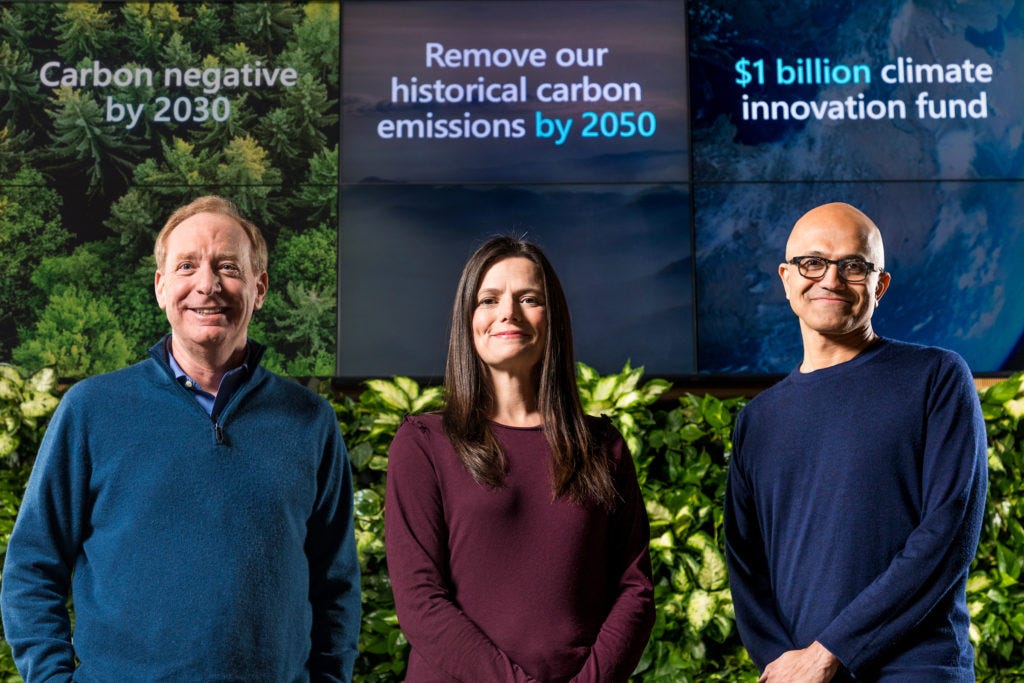10 failed 2030 sustainability commitments
Corporate and government promises to change the world by 2030 were always pure theater. Possibly sinister, too.
Not unlike individuals vowing to hit the gym on January 1st to turn over a new leaf, a decade ago governments and companies issued a flurry of astonishing pledges to achieve net-zero emissions, adopt fully electric fleets, power the grid with only wind and solar, and eliminate plastic waste, among other things, all by 2030.
However, just like the many gym memberships that go unused by February, many of these promises are now being quietly revised or abandoned as the reality of the logistical, financial, and technological challenges hits home.
Bold declarations to change, no matter how well-intentioned, too often lack the necessary planning or commitment to follow through. Once the publicity surrounding climate pledges faded, the real work of implementation set in. And that’s where the trouble began.
The 2030 commitments were never about achieving specific goals — they were about virtue signaling a sense of ‘leadership’ in a world gripped by narratives about existential climate crises and crushing inequality.
Leadership, however, requires more than press releases and pledges. It requires honesty and it demands action. It’s becoming increasingly clear much of what was promised for 2030 was never actually meant to happen. Save for the chaos a decade or so of looney-tunes policies have created.
While the flurry of announcements issued circa 2015 sounded impressive, successfully capturing headlines and shareholder goodwill for a bright clean future, when the rubber hit the road they proved to be little more than theater — strategic posturing meant to score public relations brownie points and encourage an unsuspecting taxpayer to support public-private partnerships in support of ‘greening’ everything.
Now, as the 2030 deadline looms ever closer, the cracks are showing and many commitments are being quietly revised, delayed, or abandoned. The truth is that many of these goals were unrealistically ambitious from the outset, and their failure to materialize should come as no surprise.
We here at Collapse Life believe the repeal of the commitments should be met with as much fanfare as the promises themselves. So herewith is our list of 10 failed grand promises:
Microsoft's Carbon Negative Pledge: In 2020, Microsoft made a bold declaration that it would become carbon negative by 2030, removing more carbon from the atmosphere than it emits. However, the technology to effectively capture and remove vast amounts of carbon is still in its infancy, making the promise rather vacuous. The company’s 2024 Sustainability Report shows that greenhouse gas emissions were actually up nearly 30% over 2020 baseline levels, largely because of energy-hungry AI training.
L’Oréal’s Emissions Reduction: L’Oréal pledged to reduce its greenhouse gas emissions by 50% per finished product by 2030, compared to 2016 levels, but as yet has only reduced them by 9%. Although L’Oréal has integrated some more sustainable practices, challenges with tracking emissions across its vast supply chain, combined with rising material costs, are making it difficult to meet its ambitious targets.
Zara's Energy Pledge: Zara, a major fast fashion brand, announced that none of its suppliers or manufacturers would use coal as an energy source by 2030. This promise was part of its broader strategy to shift toward sustainable production. However, the fast-fashion model, which relies on rapid production cycles, remains heavily dependent on traditional energy sources, making this goal increasingly unattainable.
Shell’s Net-Zero Commitment: Shell pledged to reduce its absolute emissions by 50% by 2030, compared to 2016 levels. However, faced with rising global energy demand and the ongoing energy crisis, Shell has walked back on its commitment, scaling down its ambitions and continuing to invest in oil and gas projects. They company is now targeting a 15-20% reduction in net carbon intensity of its energy products by 2030 compared with 2016 intensity levels.
Amazon's Climate Pledge: Amazon committed to reaching net-zero carbon by 2040 as part of its "Climate Pledge," with a goal to power all its operations with renewable energy by 2030. However, a recent joint investigation by a group of NGOs found a significant rise in Amazon’s CO2 emissions since the pledge was made: “From 2019 to 2023, Amazon’s delivery van carbon dioxide emissions grew 190 percent, and its heavy-duty truck emissions grew by 51 percent.”
Volkswagen’s EV Push: Volkswagen, in the wake of its emissions scandal, pledged to transition to fully electric vehicles by 2030. While the company has invested heavily in EVs, ongoing labor and supply chain issues, chip shortages, and slow EV adoption in key markets have hampered progress. The company is still dependent on combustion engine vehicles for much of its revenue, making it unlikely to fully transition by the 2030 deadline. If it survives until then.
Nestlé's Plastic Waste Reduction: Nestlé committed to making 100% of its packaging recyclable or reusable by 2025, with an eye toward eliminating plastic waste entirely by 2030. Yet, the company has been criticized for the sheer scale of plastic it continues to produce. In 2022, Nestlé moved its own goal posts to make its inaction more presentable. As Bloomberg reports: “The shift in language on the website of the world’s largest food maker pledged to mostly use plastic ‘designed for’ recycling by 2025 rather than only use ‘recyclable’ or reusable packaging by next year — its original commitment.”
Google’s Carbon-Free Energy Commitment: In 2020, Google pledged to run its data centers and offices entirely on carbon-free energy 24/7 by 2030, a bold move in the face of growing environmental concerns. Yet, like so many corporate sustainability promises, this commitment seems more about optics than actual feasibility. While Google made some headway by purchasing renewable energy to offset its emissions, the company continues to rely heavily on non-renewable energy sources, especially in regions where renewable energy infrastructure is weak or unreliable. Bloomberg found Google’s total planet-warming emissions in 2023 were 48% higher than 2019 due to AI. Do no evil, right?
Volvo’s Fully Electric Pledge: In 2020, Volvo made a bold commitment to sell only electric vehicles (EVs) by 2030, aiming to be a leader in the automotive industry's transition to sustainability. However, as of September 2024, the company has walked back this promise, citing slow progress in developing charging infrastructure, fluctuating consumer demand, and economic pressures like tariffs. Volvo now plans to sell a mix of electric, hybrid, and traditional vehicles, marking a significant departure from its original fully electric vision.
The United Nations’ Failure to Meet Its Own 2030 Sustainable Development Goals (SDGs): Perhaps the most glaring example of missed 2030 commitments comes from the UN's own SDGs, a global set of goals designed to address pressing issues like poverty, inequality, and climate change. At the halfway mark, the UN admitted that progress on most of the 17 goals was “woefully off track,” with over half the targets seeing weak or insufficient advancements.
Extreme poverty is rising, hunger is increasing, and the goal of providing universal access to clean water and sanitation remains a distant dream. The financial and political commitments from member states have fallen far short of what is necessary to achieve the targets. In addition, nations have repeatedly failed to deliver on financing promises, making the SDGs more of a symbolic gesture than a roadmap for real change. Yet, the nations are meeting as we speak to adopt an insidious Pact for the Future. If at first you fail, try again.
Visual bonus — Germany!
Germany — long an industrial and manufacturing powerhouse — has been one of the strongest advocates for a fully green transition of its entire nation. Headlong into that transition they have gone, with devastating impact to its economy and population. We present, without comment, what Germany’s post-industrial future looks like courtesy of the brilliant satirist William Banzai7:
The uncomfortable truth is that many of these commitments have always been designed to signal ‘progressiveness’ and earn goodwill — mostly among the laptop class and ivory tower set — without a full understanding of the impacts on real people.
Those in power rely heavily on the collective amnesia fostered by years of zombification from Mr. Beast videos and Candy Crush Saga; the substantive changes required to make insane transformational goals reality was more about the applause, catchy slogans and aspiration to ‘save Gaia.’ Not achieving the goals, or slyly changing the goal posts, was potential backlash to deal with in years to come, if at all.
With just a few years until 2030, many are beginning to recognize that the sugar high of feel-good commitments is wearing off. They were largely over-promised and under-delivered. Ultimately though, the tragedy is not that.
The tragedy is that both government and corporate entities see themselves as playing God, pretending to make serious, monumental societal promises without understanding complex systems and their interconnectedness. If one was of the conspiracy sort, one could even make an argument that the vast sums of taxpayer dollars available for the lofty goal of ‘saving the planet’ was just too great to ignore. After all, spending billions of dollars to build just seven electric vehicle charging stations is either incompetence, negligence, or just good business.
The next time a government, corporation, or a government in partnership with a corporation announces a grand vision for whatever goal for whatever year, the first question should be: cui bono? Who benefits? If the answer isn’t clear, or if it relies on speculative technologies and infrastructure, or an economy that’s impervious to shocks, or a geopolitical system that’s free of the threat of war or factionalism, then it’s likely just more theater.









Lets' not forget the grift of making policy to benefit their friends, while not outright printing money to enrich them.
Your final paragraph says it all but I would also like to point out that the UN, WEF, WHO, Bill Gates and friends are doing everything they can to implement the new world order that would enforce their dystopian visions. They will enslave us with digital ID, CBDC's, psychological warfare, and the rest of their toxic inhuman agenda unless we find a way to disempower them. Very sinister.